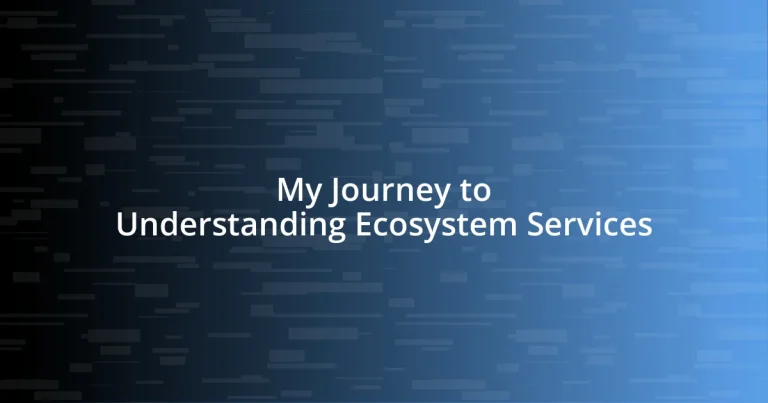Key takeaways:
- Ecosystem services provide vital benefits, including clean air and water, pollination, and climate regulation, essential for human health and well-being.
- Historical perspectives show a long-standing recognition of the importance of nature, with recent efforts focusing on integrating ecosystem services into policies for sustainable development.
- Individual actions, such as composting and creating wildlife-friendly gardens, significantly contribute to supporting and preserving local ecosystems.

Defining Ecosystem Services
Ecosystem services are the benefits that humans derive from nature, ranging from clean water and air to pollination and climate regulation. Reflecting on my own experiences camping in a serene forest, I’ve often marveled at how the towering trees not only provide shade but also support diverse wildlife and contribute to air quality. Isn’t it fascinating that these services go beyond our immediate perception?
When I learned about ecosystem services, it struck me how interconnected everything truly is. For example, when I gardened, I realized that my plants thrived thanks to the hardworking bees buzzing around. This made me ponder: how often do we take for granted the role of such tiny creatures in our food system and overall wellbeing?
In essence, ecosystem services are our planet’s way of supporting life and enriching our daily existence. If we consider how these services influence our health and happiness, it’s hard not to feel a deep sense of responsibility for preserving the environments that provide them. Each time I step outside, I’m reminded of the vital connections that sustain us all.

Historical Overview of Ecosystem Services
Understanding the historical context of ecosystem services offers invaluable insight into why they matter today. I remember reading about early civilizations that revered nature, treating forests and rivers as sacred. This perspective illustrates how long humans have recognized the benefits provided by ecosystems, though it wasn’t always articulated as “ecosystem services.”
Consider the following key moments in history:
- Ancient Cultures: Many ancient societies practiced sustainable resource management, understanding the balance needed to thrive.
- Economic Development: During the Industrial Revolution, nature’s contributions were often overlooked, leading to significant environmental degradation.
- Research and Recognition: In the late 20th century, scientists began formalizing the concept of ecosystem services, framing it as essential to biodiversity and human well-being.
- Policy Integration: Recently, governments and organizations have started to incorporate ecosystem services into environmental policies, reflecting their critical role in sustainable development.
These historical perspectives not only shape my understanding but also evoke a sense of nostalgia for a time when nature’s gifts were more widely acknowledged and valued. I often reflect on how my own upbringing in a rural area gave me a firsthand appreciation of these resources, whether it was fishing in a local stream or gathering berries in the woods. Each experience has deepened my commitment to understanding and preserving the natural world that has so profoundly influenced my life.

Importance of Ecosystem Services
Ecosystem services play a critical role in our daily lives, often in ways we may overlook. For instance, during a hike in my favorite nature reserve, I was struck by the sound of a babbling brook. This gentle stream not only enhances the landscape but also serves as a vital water source for local wildlife and even irrigates nearby crops. It made me realize how interconnected our lives are to these natural systems, where every drop counts.
Reflecting on my gardening adventures, I remember the thrill of harvesting juicy tomatoes from my backyard. This joy didn’t just come from the taste but also from understanding the intricate processes that helped those plants flourish. Healthy soil, local pollinators, and balanced ecosystems all contributed to that success. When I think about it, these ecosystem services are like an invisible support network, quietly helping us every day without demanding recognition.
Ultimately, the significance of ecosystem services runs deeper than just convenience. They influence our health, economy, and environment. The fresh air I breathe while walking my dog or the shade I seek during hot summer days are blessings I often cherish. It brings me peace to know that, just as I’m part of this complex web, I also have a responsibility to protect it for future generations.
| Ecosystem Services | Importance |
|---|---|
| Supports Biodiversity | Maintains ecological balance, providing habitat for various species. |
| Enhances Human Health | Improves air quality and provides fresh water and nutritious food. |
| Boosts Economic Stability | Offers resources for industries like agriculture and tourism, benefiting local economies. |
| Climatic Regulation | Helps in carbon sequestration, mitigating climate change effects. |

Types of Ecosystem Services
Ecosystem services can be broadly categorized into four main types: provisioning, regulating, cultural, and supporting. Provisioning services provide us with tangible resources, like food, water, and raw materials. I vividly recall foraging for wild mushrooms in the nearby woods; it was an exhilarating experience that connected me with nature’s bounty, highlighting just how reliant we are on these natural offerings.
Regulating services, on the other hand, refer to the processes that maintain ecological balance, like climate regulation and air purification. One hot summer, I remember often retreating to a dense forest where the canopy created a cooling effect. As I leaned against a tree, it struck me how these towering giants not only offered shade but also filtered the air I breathed, making me more aware of the intricate processes at play beneath the surface.
Cultural services encompass the intangible benefits we derive from nature, such as recreation, aesthetic enjoyment, and spiritual enrichment. I often find myself seeking solace by the shores of a tranquil lake, the gentle sound of waves lapping against the rocks calming my mind. Isn’t it fascinating how such places can evoke deep emotions and foster a sense of connection? These experiences remind me that ecosystems are more than just resources; they are vital to our well-being, shaping our culture and spirit.

Assessing Ecosystem Services
Assessing ecosystem services isn’t just a scientific exercise; it’s an ongoing journey of discovery for me. When I first began to understand these services, I hiking through a vibrant forest. I paused to observe the diversity of plant species around me, and it dawned on me that each plant provides unique benefits, whether through carbon storage or habitat creation. This realization made me appreciate the complexity and importance of ecosystem assessments.
During my exploration of local wetlands, I was struck by the role these environments play in flood regulation. As I walked along the water’s edge, I couldn’t help but notice how the lush vegetation acted like a sponge, soaking up excess rainfall. This personal experience brought the concept of regulating services to life, emphasizing how thoughtful assessment can highlight the ecological functions that might otherwise go unnoticed.
While engaging in citizen science projects, I realized that our collective efforts can greatly enhance the assessment of ecosystem services. I remember submitting a report on the seasonal changes at a local park. Witnessing the transformations throughout the year not only deepened my understanding of ecological dynamics but also reinforced the idea that each observation contributes to a bigger picture. Isn’t it amazing how community involvement can bridge the gap between scientific understanding and everyday life?

Integrating Ecosystem Services into Policy
Integrating ecosystem services into policy is essential for creating sustainable development frameworks. I remember attending a local town hall meeting where community members discussed the importance of preserving nearby forests for their flood mitigation benefits. It was inspiring to see residents advocate for policies that not only protect our natural resources but also strengthen our resilience against climate change.
As I delved deeper into this topic, I realized the importance of collaboration between policymakers and environmental experts. At a workshop I participated in, experts presented case studies where integrating ecosystem services into urban planning led to enhanced quality of life. It was eye-opening to see how green spaces could reduce urban heat, improve air quality, and provide recreational opportunities—all of which can be quantified and included in policy discussions.
One aspect that often resonates with me is the need for tangible metrics to support these discussions. During a recent seminar, I heard an expert explain how including the economic value of ecosystem services in cost-benefit analyses can change the narrative around conservation. It made me wonder: how often do we overlook the real-world benefits of nature when making decisions? This realization highlights that integrating ecosystem services into policy isn’t just a theoretical exercise—it’s a critical path toward holistic decision-making that acknowledges what nature gives us every day.

Personal Actions for Ecosystem Services
Taking personal action to support ecosystem services can seem daunting, but small steps can lead to profound impacts. For instance, I began composting my kitchen scraps when I realized how much organic waste we produce and how it can enrich soil health. Watching the transformation of food waste into nutrient-rich compost felt like magic, yet it also underscored the crucial role individuals play in enhancing local ecosystems. Have you ever considered how your kitchen habits could contribute to something larger?
I remember switching to native plants in my garden, driven by the desire to create a welcoming habitat for local wildlife. Over time, I noticed more butterflies and birds stopping by, which not only beautified my space but also reminded me of the intricate connections between species. This experience made me appreciate how everyone’s choices—no matter how small—can ripple through the ecosystem, supporting biodiversity right in our backyards.
Lastly, I often participate in community clean-up days along nearby rivers. Each time I pick up trash, I feel a personal connection to the land and a responsibility for its health. It’s an empowering experience to know that my actions, combined with those of my neighbors, can restore the beauty and functionality of our waterways. Isn’t it inspiring to think about the direct impact we can have just by showing up and taking action? Together, these personal commitments create a collective force for preserving and enhancing ecosystem services around us.














